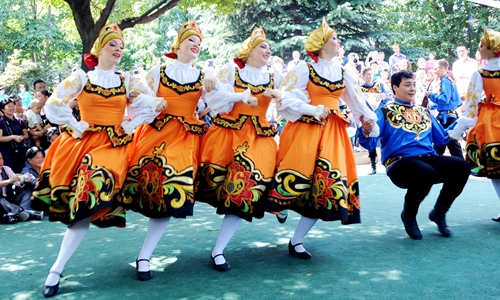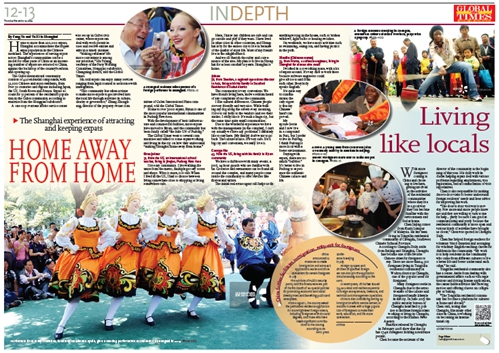
Performers from many countries, including Russia and Spain, give a dancing performance to residents in Shanghai. Photo: VCG
Home to more than 200,000 expats, Shanghai accommodates the largest expat population in the Chinese mainland. The experiences of serving expats across Shanghai's communities can be a model for other parts of China as an increasing number of expats are attracted to China, against the backdrop of the country's reform and opening-up.
The Gubei international community consists of 42 residential compounds, with 32,000 Chinese and expat residents, from over 50 countries and regions including Japan, the US, South Korea and France. Expats account for 51 percent of the residential population in the Gubei community, according to statistics from the Hongqiao subdistrict.
A one-stop overseas affairs service center was set up in Gubei civic center, where expats can deal with work permit issues and resolve entries and exits in a timely manner.
"Making residents' life more convenient is among our priorities," Hu Yu'ang, secretary of the Party Working Committee, Hongqiao subdistrict, Changning district, told the Global Times.
Hu said expats can enjoy many services ranging from legal counsel to assistance with immigration.
"This community has taken actions to make more expats to get involved into the local life through activities in culture, charity or governance," Zhang Zhongliang, director of the property owner committee of Gubei International Plaza compound, told the Global Times.
Home to over 7,000 expats, Biyun is one of the most popular international communities in Pudong New Area.
With the development of basic infrastructure and commercial facilities, more expats have moved to Biyun, and the community has been fondly called "the little UN of Pudong."
The Global Times went to several communities and talked to some expats working and living in the city on how they understand "making Shanghai home away from home."
Bree Joiner
37, from the US, an international school teacher, living in Jinqiao, Pudong New Area
I love my community. I live walking distance from the metro, multiple grocery stores and shops. What is more, it is safe. When I lived in the US, I had to choose between living somewhere close to shopping or living somewhere safe.
Here, I know my children are safe and can go outside and play if they want. I have lived in other cities in other countries, and Shanghai is by far the easiest city to live in because of the quality of expat life. Most of my friends live in the neighborhood.
And we all cherish the safety and convenience of the area. My plan is to live in Shanghai for at least another 10 years. Shanghai is home.
Johan
38, from Sweden, a regional operations director in Asia, living with his family in Stanford Residence in Xuhui district
The community is very convenient. We have friends living here, and we seldom heard of any complaints about the community.
I like cultural differences. Chinese people are very friendly and very nice. While walking my dog along the streets every morning, I love to say hello to the vendors and see their smiles. I really like it. It's such a huge city, but the same time quite small communities.
Due to the wonderful experience we have with the management (in the complex), I can't say actually we have any problems. I definitely like to stay here. (My family) don't want to go back. The culture is nice. It's very safe. It's a big city and convenient, we really love it.
George Hu
43, from the US, living with his family in Biyun community
We have a clubhouse with many events, a pool, 24-hour guards who are familiar with us. Groceries and restaurants can be found all around the complex, and many people come inside the community to offer services like florists and tailors.
The initial real estate agent still helps us fix anything wrong in the house, such as broken windows, light bulbs or heating switches.
On weekends, we have more activities such as swimming, eating out, and having picnics in the park.
Xiaolin (Chinese name)
33, from France, a software engineer, living in Shanghai for almost nine years
I worked in a co-working space, with a lot of expats around. It's very nice to work there because software engineers could give advice to and from each other. Everybody speaks English.
It's quite easy to communicate; the only regret is that my Chinese hasn't improved.
My spouse Jessie and I now live in a compound in Puxi, but I prefer to live in Pudong. I think Pudong is more local with a better environment.
Staying with expats, there are too much "bubbles." It's better to live in Pudong to experience the authentic Chinese culture and life.

A Shanghai resident takes photos of a foreign performer in Shanghai. Photo: IC
China announced 12 measures to make immigration and entry-exit applications easier and more convenient for certain foreigners in July.
The Ministry of Public Security (MPS) said the measures were part of the first batch of 60 special policies for promoting economic and social development and benefiting public and enterprises.
From August 1, the country eased the permanent residence application for more high-level foreign talents, including foreigners with doctoral degrees, and those who have made significant contributions to the country, according to an MPS press conference in Beijing in July.
Foreign spouses and children of qualified foreigners can also join the application simultaneously, according to the MPS.
In recent years, China has issued 133,000 visas and residence permits to foreign entrepreneurs, investors, and technical and management specialists.
China is also considering setting up immigration affairs service centers or stations in areas with a large population of foreigners to make their work, education, and life more convenient.
Xinhua


